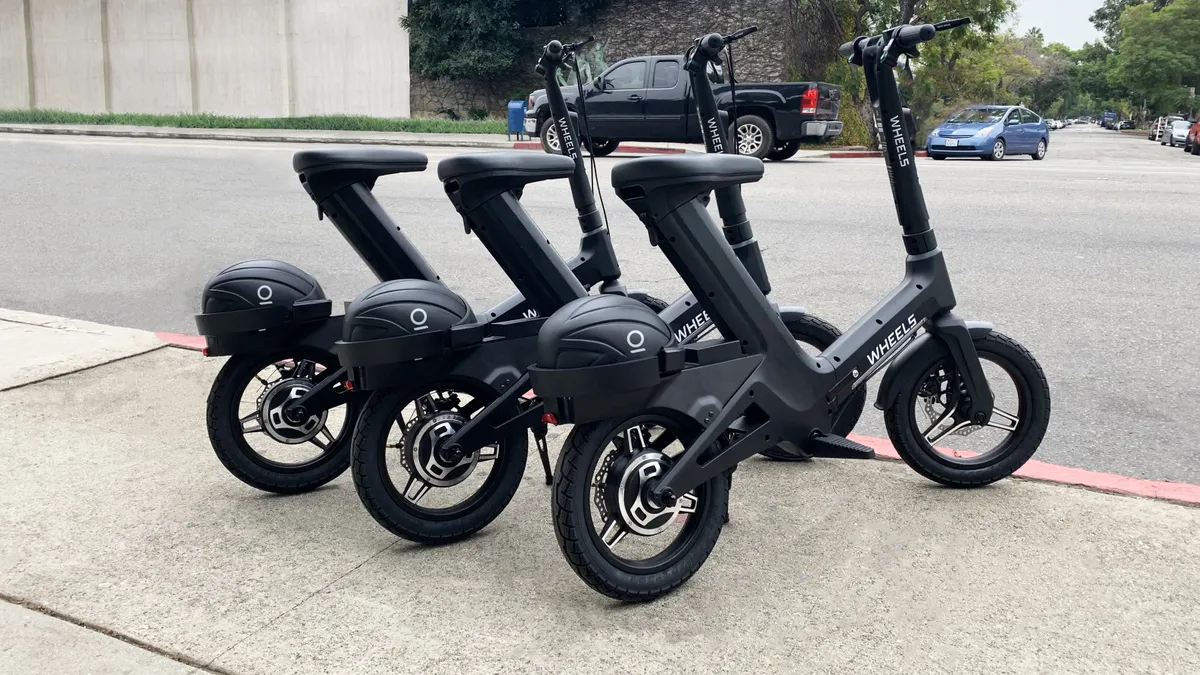Dive Brief:
- Electric bike-share company Wheels announced it will integrate free, shareable helmets into its fleets.
- A helmet will be locked on each e-bike's rear fender, which riders can unlock via the app. The helmets will have 30 removable, biodegradable liners that can be switched out between each ride. Bike sensors will recognize when the helmet is in use and when it is returned at the end of the trip, and riders will be charged for the cost of the helmet if it is vandalized or not returned.
- The integrated helmet program will launch in Los Angeles and then incrementally roll out to other markets where Wheels operates. During the initial rollout, riders will receive a 20% discount on their trip if they unlock and use the helmet.
Dive Insight:
While the shared scooter and bike craze has rapidly gained popularity in the U.S., helmet use has been slow to catch on. Some micromobility companies — including Lime and Bird — send a free helmet to customers who ask for one, but Wheels' blog says it's inconvenient and impractical for shared mobility customers to carry around their own helmets. The hassle is especially true for people who only use shared mobility occasionally instead of regularly.
Wheels says that simply mailing free helmets isn't enough to encourage their use. "The helmet has to actually be part of the device if riders are going to use it," the blog post says.
The company reportedly considered sustainability when developing the integrated helmet feature. It does not have to purchase entirely new vehicles because the helmet locking devices will be retrofitted onto all of the existing bikes. The company also considered hygiene with the inclusion of biodegradable headliners "that can be peeled off before each use," which is a more sanitary alternative to simply wiping down bike helmets, as is the practice with Revel's shared helmets.
Bicyclist and scooter rider safety has garnered increased attention lately with the surge of shared devices on U.S. streets. This spring the CDC released the results of an e-scooter study it conducted because injuries had reached near-epidemic levels. The study found that nearly half of the people injured while riding an e-scooter sustained a head injury, but helmet use among scooter riders is nearly non-existent.
New York is stepping up investments in bike infrastructure and safety initiatives in light of the rash of cyclist deaths this year. San Francisco is doubling its production of protected bike lanes to protect cyclists.
This fall, the National Transportation Safety Board (NTSB) voiced concern about the uptick in cyclist deaths and recommended that cities invest more heavily in infrastructure like protected or separated bike lanes and two-stage bicycle turn boxes at intersections. The NTSB also made the controversial recommendation that states implement mandatory helmet laws for all cyclists of all ages.
Wheels suggests its integrated helmets not only increase customer convenience, but also eliminate excuses for not using safety protections.
"We hope that riders recognize that a helmet can save their lives. When one is offered to you for free without requiring you to carry one around, using it is a no-brainer," the blog post states.
This piece has been updated to include information from Wheels regarding the helmet liners and security of the helmets.











